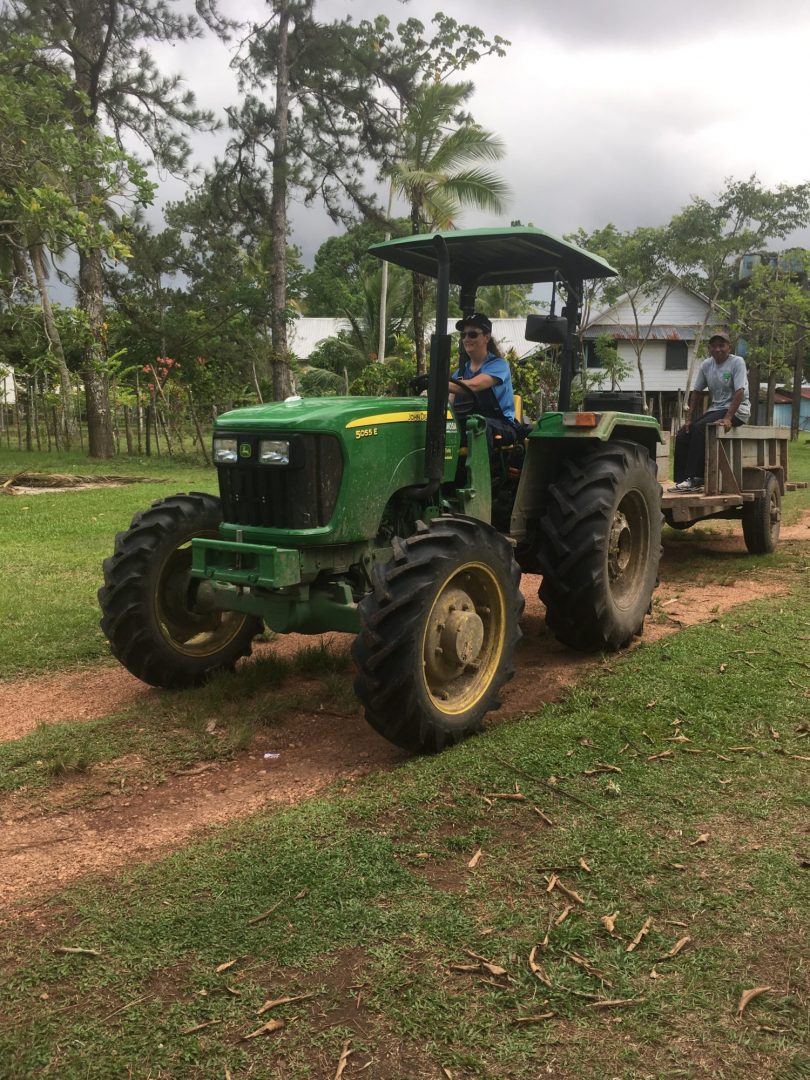(A John Deere tractor donated by Moravians in North Dakota helping the farmers in Honduras)
The Good Seed and the Weeds, Only God Knows for Sure
by Bishop Chris Giesler
Preaching Text: Matthew 13:24-30, 36-43
Last week in Matthew 13:1-6, 18-23, we pondered the unconventional sowing techniques of a strange farmer. A farmer who chose to be radically generous, if not extravagant, with sowing his love and grace in the world. He didn’t just pick a few perfect patches of soil to plant seed, but he sowed here, there, and everywhere. The farmer planted on rocky ground, the pathway, and even the good soil. Thanks be to God for that, for the lesson learned is that God loves us just as we are but asks us to continually make our hearts more receptive to what God is planting within us and bear fruit in the world.
This week that farmer is still at work, but this time he has finally decided to sow good seed only in the plot of ground that has been prepared for it. But still, this farmer has some problems. Now it is his enemy that comes along while everybody is sleeping, and he sows the seeds of weeds among the good seed, and they start growing along with the wheat.
The Rev. Warren Kufahl was a much-beloved pastor in several congregations of the Northern Province of the Moravian Church in North America. He passed away several years ago. One of these places was the Hope Moravian Congregation of Hope, Indiana. This is a very small town in the middle of the corn farm belt of the mid-west. Several members of the congregation tend to large tracts of land upon which they often plant corn – lots of corn. So not long after Pastor Warren had moved to Hope, he decided to plant a garden in which he wanted to grow some sweet corn. Never having planted a garden, he asked the local farmers for tips on ensuring a good harvest, which they did. Within a few days, those farmers helped the young pastor till the soil and plant the crop. But that very night, after the pastor had gone to sleep, several of the farmers decided to play a joke on their new pastor by going to their own fields and carefully pulling up corn that had been planted more than a month before and was now more than knee high. They took this bumper crop over to the pastor’s garden plot and replanted it. You can imagine Pastor Warren’s surprise the next morning when he saw corn as high as 2 feet coming up in his garden. This is a great story about friends helping to welcome a new pastor to town by messing with his garden, but in today’s text, it is an enemy messing with the crop in the field.
Here the farmer has carefully planted wheat, but an “enemy” has come while everyone was asleep and sowed weeds in the field. When the plants grow, it becomes apparent what has happened, so the workers ask what should be done; should they start weeding out the bad stuff? The farmer instructs them to let it all grow together because if the field is weeded now, you can damage the good wheat. So wait for harvest, keep the good grain, and burn the weeds.
It is evident that in this parable, Jesus is the farmer, and the seeds represent humanity. Some of this seed is sown by God for good, and the enemy sows some of it for evil. The field is the world.
Let us recognize the fact that Jesus says that we are held accountable for the things that we do in this life. This is particularly so if our sins hurt people at the margins and if we don’t confess, repent, and change our lives.
Secondly, let us be clear that the weeding is up to God, not us. God expects a lot out of us here on earth, but weeding is not on our to-do list. God does the weeding at the end of time. Jesus is saying here that it is not our job to do the weeding; that is God’s job. How often it is that we feel that it is up to us to straighten out the world. To make sure that everybody around us is getting it right. It is not our job to say who is in and who is out. Who belongs, and who does not.
I have long since given up weeding the flower garden at the home that I share with my wife. Too often, I have tried to help but pulled up what looks like a weed to me, only to find out that I just pulled up something she has carefully planted. We might not know precisely what is good seed and what is evil. We might think we know who is in and who is out, but let’s be honest, we look at the world through human eyes. We look at others through lenses often clouded by our self-interests and prejudices. But God sees the world from a very different perspective.
Instead, our mission is to be the best seed we can be and put all our energy into producing fruit. Fruit like love, joy, peace, patience, kindness, generosity, faithfulness, gentleness, and self-control.
We live in a broken world, and we cannot expect things to be perfect. As a result, there is the good seed and the weeds, but we often need help to know the difference. The best we can do is bear fruit for God’s kingdom. At the same time, we are called upon to kneel in deep humility and ask God to pull any weeds that may be growing in our hearts. These may be weeds of bitterness, weeds of envy, weeds of prejudice, weeds of selfishness, and the list goes on and on. You know which weeds are choking your spirit. Today, give them to God. Let God throw them into the fire and consume them forever. God is our creator. God is our Redeemer through Jesus Christ and our sustainer through the power of the Holy Spirit. God is the Master Gardener of our lives. Let God put the garden of your life in perfect order again. And let us make it our mission to bear the fruit of the spirit: love, joy, peace, patience, kindness, generosity, faithfulness, gentleness, and self-control.







